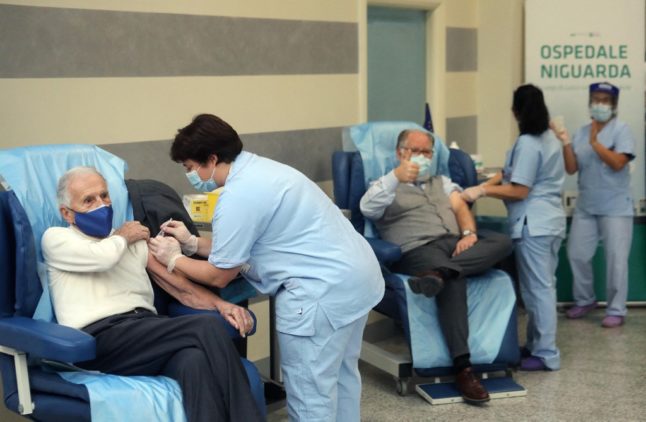MILAN
Italy to pump €3.6bn into industries hit by coronavirus
Italy's economy minister promised Sunday to deliver 3.6 billion euros ($4 million) in emergency aid -- equivalent to 0.2 percent of the country's entire economy -- to sectors affected by the new coronavirus epidemic.
Published: 1 March 2020 17:03 CET

Tourists wearing facemasks in Milan last week. Photo: AFP
The package must still be approved by the Italian parliament and the European Union.
“By next Friday, we will adopt (measures) to support the economy for all the sectors affected across the country,” Roberto Gualtieri said in an interview published in Sunday's La Repubblica newspaper. “I have no reason to fear Brussels contesting our request.”
Every EU member state must keep within strict budget rules and limit deficit spending to set amounts or face sanctions and fines from Brussels.
Gualtieri said the aid could take various forms and include tax credits for businesses.
He also announced that the 19 eurozone finance ministers will discuss a possible joint action plan at their meeting on March 16. Italy's public deficit for 2019 will be disclosed on Monday by the state statistics agency.
Gualtieri said the figure should come in at “between 1.6 and 1.7 percent” of gross domestic product and well within the constraints set by Brussels.
Italy's financial health is “very good”, he said.
But he also admitted that the epidemic would make a tangible impact on growth over the first three months of 2020.
The Italian government had already on Friday unveiled a first set of support measures for businesses and communities in 11 small towns in northern Italy quarantined because of the outbreak.
COVID-19 has killed 29 people and infected more than 1,000 people in Italy.
Url copied to clipboard!


 Please whitelist us to continue reading.
Please whitelist us to continue reading.
Member comments